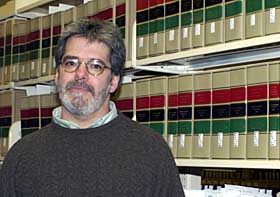For more archives, go to the Advance Archive/Search Page.
Political Scientist Examines
Business, Government Relations
Some scholars tackle subjects that can be tied into neat, satisfying packages in several hundred pages. Others, like Brian E. Waddell, an associate professor of political science at the Stamford campus, set their sights on more sweeping vistas.
 |
|
Brian Waddell, an associate professor of political
science at the Stamford campus, is co-author of a new book, What American
Government Does. Photo by Melissa Arbo
|
The title of Waddell's upcoming book, What American Government Does, makes the point. Like his first book, The War Against the New Deal, this latest tome will surely not funnel down to a handful of concise conclusions. Rather, it will challenge readers to think broadly about the uses of power in Washington and be skeptical of campaign trail clichés about the threat of 'big' government.
"As a citizen and a political scientist, I'm concerned about power, who wins and who loses," he says. "And power for me does not begin and end with government, but includes the power of major corporations to influence policy and even the institutional design of government."
As a scholar, Waddell's concern with corporate power led him to develop an approach that combined American political development and political economy. As a citizen, Waddell says he's "concerned that a system that tilts too much in favor of what corporations want produces outcomes that violate at least some of what democracy is all about: equality, fairness, equity, maximizing public input, respect for all members of our society, and so forth."
Waddell's fascination with relations between business and government blossomed in his undergraduate years at the State University of New York, and continued in graduate school at City University of New York.
Growing up in a small town in upstate New York, Waddell was the only one of eight children in his family to get a college degree. He might have gravitated toward a far different career, especially after taking time off between high school and college to work construction and manufacturing jobs.
But his town - Oriskany - was the site of the bloodiest battle in the American Revolution, and his father was in the Army Air Corps of World War II, two factors that may have contributed to his interest in history.
Waddell became fascinated with Franklin Delano Roosevelt and the shifts in power that occurred during his era, from the states to Washington, and from Congress to the president. The FDR years, the time of the Great Depression and World War II, led to the development of what has been called the warfare/welfare state. Much of Waddell's research traces the ebb and flow of this bifurcated state.
He shows how the good work - begun during the New Deal on behalf of citizens - faltered, as an alliance grew between government and business. During and following World War II, business and government power meshed in new ways, he says. And in the ensuing years, the ability - and disposition - of business to exert influence in Washington only grew.
In Waddell's view, the New Deal's expansion of government responsibilit y toward citizens' well-being was supplemented and even supplanted by a new goal: to shape international events in the name of national security, sometimes by force. In other words, warfare tended to take precedence over welfare. He sees this trend continuing.
Waddell examines the institutions, events, and forces that led the U.S. government to focus more on projecting power beyond its borders than providing the benefits of a modern welfare state to its citizens. In research that took him to archives across the nation, Waddell traced the emergence of an influential military-corporate alliance.
Waddell says his new book, of which he is co-author along with University of Northern Colorado political scientist Stan Luger, seeks to understand government in terms of some basic functions and responsibilities that are true of governments in all advanced societies. He finds campaign rhetoric about 'big' government disingenuous, since, he says, the record shows that 'big' government is here to stay. The question is, will it be an activist government directed by an informed electorate, delivering benefits and services with equity? he asks.
"Government may be like food. Government, like food, is not a necessary evil; it is simply a necessity," Waddell says. "But, like food, government can be abused. It all depends on the program you're talking about, and how it's delivered.
"Government, like food, can certainly bring tremendous benefits," he adds. "And the more democratic it is, the easier it is to judge abuses and whether the benefits are worth the trouble or not."

